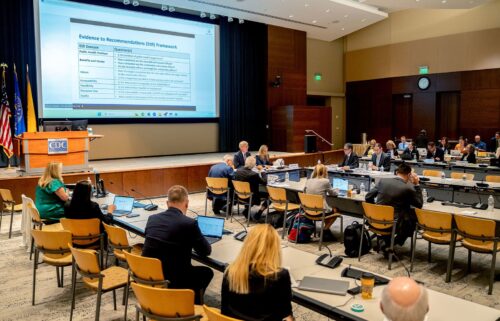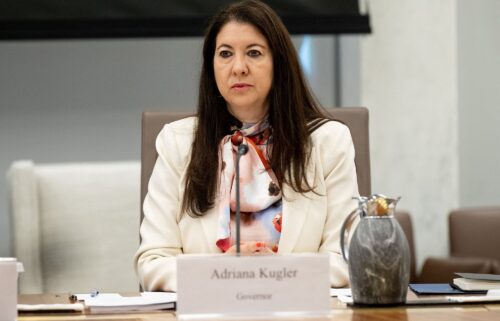Judge halts Trump’s proclamation to suspend new international student visas at Harvard hours after university filed amended lawsuit

Harvard’s leadership has asked a court to stop the Trump administration’s latest attempt to block international students.
By Andy Rose, Emma Tucker, Devan Cole, CNN
(CNN) — A federal judge has halted President Donald Trump’s latest attempt to block international students from coming to Harvard University.
The temporary restraining order issued late Thursday by US District Judge Allison Burroughs comes hours after the university urged the judge to step in on an emergency basis to block a proclamation Trump signed a day earlier that suspends international visas for new students at the nation’s oldest and wealthiest university. Foreign students make up roughly a quarter of the school’s student body.
The brief order from Burroughs said if she didn’t intervene now, the school would “sustain immediate and irreparable injury before there is an opportunity to hear from all parties” over the challenge to Trump’s edict. The judge said her order “shall remain in effect until further order of this Court.”
Burroughs, an appointee of former President Barack Obama, set a hearing for mid-June to hear arguments over whether she should block Trump’s proclamation indefinitely.
Harvard’s request to block Trump’s ban amended an existing lawsuit over the administration’s move to end Harvard’s ability to enroll international students, which initially prompted the judge to stop the administration from revoking Harvard’s student visa program.
The amended lawsuit claimed Trump’s proclamation violated the First Amendment by temporarily blocking the entry of nearly all new international Harvard students under visas most use to study at US universities or participate in academic exchange programs.
Trump’s proclamation directed the Secretary of State “to consider revoking” the visas – known as F, M and J visas – for current Harvard students who meet the proclamation’s “criteria,” the White House said in a statement.
“With the stroke of a pen, the DHS Secretary and the President have sought to erase a quarter of Harvard’s student body, international students who contribute significantly to the University and its mission and the country,” the amended complaint reads.
“Without its international students, Harvard is not Harvard,” it says.
The visa program, which allows international students “to enter the United States on nonimmigrant visas to enroll at Harvard and thousands of other schools, have boosted America’s academic, scientific, and economic success and its global standing,” the lawsuit says.
In its amended lawsuit, Harvard rebutted claims by the White House that the proclamation is an attempt to “safeguard national security” and said it represents “a government vendetta against Harvard.”
“It escalates and intensifies the campaign of retaliation in violation of the First Amendment,” the amended suit reads. “… Just as the revocation unconstitutionally intrudes on academic freedom, the Proclamation unconstitutionally intrudes too.”
Trump’s proclamation hinges on a statute that gives the president authority to protect the nation from “any class of aliens whose entry would be detrimental” to the interests of the US, according to the document. But Harvard argues Trump is not suspending entry for any such class: “To the contrary, nonimmigrants may enter the country unabated, as long as they do not attend Harvard,” the lawsuit reads.
In a statement to the university community on Thursday, Harvard President Alan Garber said the proclamation is “yet another illegal step taken by the Administration to retaliate against Harvard.”
Harvard’s international community, Garber said, “make outstanding contributions inside and outside of our classrooms and laboratories, fulfilling our mission of excellence in countless ways.” The institution will “celebrate them, support them, and defend their interests as we continue to assert our Constitutional rights,” he added.
CNN has reached out to the White House for comment.
What did the original complaint include?
Harvard’s initial complaint pushing back against the Trump administration’s efforts to restrict foreign students, filed May 23, argued the revocation of its certification in the Student and Exchange Visitor Program by the Department of Homeland Security was “clear retaliation” for its refusal of the government’s ideologically rooted policy demands.
Hours after the initial complaint was filed, US District Court Judge Allison Burroughs temporarily blocked DHS’ decision to drop Harvard from SEVP, which would have made it impossible for the university to host any international students. Last week, the judge ordered the Trump administration not to make any changes to Harvard’s international student visa program indefinitely.
The amended complaint says the proclamation “is a patent effort to do an end-run around” the judge’s order. “What the DHS Secretary has purported to take away on the back end by revoking Harvard’s certifications to host foreign students, the President purports to take away on the front end by preventing the students and scholars invited to Harvard from gaining entry into the country in the first place,” the complaint reads.
Garber, in his statement, said Trump’s proclamation “circumvents” the judge’s temporary restraining order, adding he hopes the court “will act swiftly” in halting its enforcement. The Harvard International Office will be in direct contact with students and scholars who may be affected by Trump’s travel ban issued the same day, Garber wrote.
While Harvard has argued in legal filings that White House orders were behind the DHS move to revoke its ability to host international students, Wednesday’s proclamation marked the first time Trump became directly involved in the dispute at the center of his broader battle against elite US academics.
Harvard is battling the White House on two fronts – both of which are being overseen by Judge Burroughs. The university filed its first lawsuit against the Trump administration for cutting more than $2.2 billion in federal funds and threatening billions more, as well as Harvard’s tax-exempt status. That money remains frozen as the case is pending in court, scheduled for arguments next month.
Consulates told to scrutinize Harvard-related visas, including social media scrubs
Trump’s proclamation also accused the Ivy League institution of failing to address antisemitism on campus as well as persistently “prioritizing” diversity, equity, and inclusion – designed to advance racial, gender, class and other representation in public spaces – that Trump decries as “illegal and immoral discrimination.”
The Department of Education has warned US colleges and universities of possible consequences if they don’t take adequate steps to protect Jewish students and separately threatened federal funding of any American academic institution that considers race in most aspects of student life.
The same day Judge Burroughs temporarily blocked the ban on Harvard’s ability to enroll international students on May 29, the US Department of State issued a cable to “all diplomatic and consular posts,” requesting increased scrutiny for prospective Harvard international students under the pretext that the initiative is a “pilot program” that affects only Harvard, according to the lawsuit.
Secretary of State Marco Rubio justified the new initiative by pointing to the DHS determination that Harvard failed to “maintain a campus environment free from violence” and antisemitism, the complaint says, citing the language in the cable.
The cable directed consular and diplomatic officers to conduct a “complete screening of the online presence” of any nonimmigrant visa applicant for Harvard, the complaint says, including “prospective students, students, faculty, employees, contractors, guest speakersk (sic), and tourists.”
Even if the applicant is “otherwise eligible” for the visa status, the cable informed recipients they must “refuse the case,” inform the applicant that their online presence is subject to review and should make their social media accounts public, the complaint says.
But applicants who don’t have any social media platforms or those who set their accounts to private could be “reflective of evasiveness and call into question the applicant’s credibility” and be refused, according to the complaint.
This story has been updated with additional information.
The-CNN-Wire
™ & © 2025 Cable News Network, Inc., a Warner Bros. Discovery Company. All rights reserved.
CNN’s Katelyn Polantz contributed to this report.



